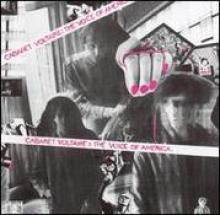There’s this thing called punk. And for whatever reason, over the last thirty some odd years, it’s worked to incorporate any and every creative pursuit into its broad umbrella. When this combination of punk and otherness does in-fact occur, it very frequently winds up becoming something beyond the foundational genre. So, things like post-punk, synth-punk and art-punk among innumerable other iterations aren’t punk (whatever that is), but an extension of it.
Of course, commoditization of the genre and Warped Tour styled nonsense detract from a broad and popular view of this music. But at it’s essence, punk is and should be all inclusive.
For that reason, over time, any number of art practices, both theoretical and aural, have been pushed through the music and resulted in a number of odd outcomes.
So a group being named Cabaret Voltaire after the venerable – and somehow still standing -performance space in Zürich shouldn’t be the greatest surprise of a life time. And while the Sheffield, UK based group appreciated the idea of Dada and the ridiculous in a broad and all inclusive manner, its music might be thought to eschew those concepts.
Most folks are going to be familiar with Marcel Duchamp’s toilet. He displayed it as art, shocked the world and has been famous for about a hundred years at this point. To a modern viewer, the move probably seems playful, at the time it probably didn’t.
It’s in this cultural space that Cabaret Voltaire, the band, and its music come into play.
To new listeners, the group and it’s first two albums – Mix Up (1979) and The Voice Of America (1980) – are going to be difficult to wade through. There’re enough malevolent electronic noises to put off almost any straight listener. And while that was most likely part of the point, there was still a joke aspect to the entire thing accounting for “This is Entertainment,” a pretty simple electronic construction with the song’s title repeated endlessly in the background.
Equally amusing is what Cabaret Voltaire does to the Seeds’ garage classic “No Escape” on its first album. Coming in as the second track should clue everyone in that this group intends to dismantle what came before it and display the results – just like the aforementioned toilet as art. At this early stage in the group’s recordings, though, the garage source material is still apparent. For just that reason, there’re more than a few folks who find CV’s subsequent recordings to warranting greater merit.
